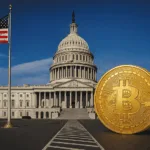- SEC Chair Paul Atkins announced that the agency aims to formalize an “innovation exemption” by late 2025 or early 2026.
- Atkins first publicly pushed the concept of exemptions in June 2025 during a crypto/DeFi roundtable.
- If enacted, these exemptions could let crypto and on-chain firms launch under limited regulatory relief, potentially transforming issuance, trading, custody, etc.
SEC Chair Paul Atkins once again reiterated that the regulator has the intention to initiate rulemaking around an ‘innovation exemption’ by year-end or early 2026. Atkins was speaking at a panel at a Futures & Derivatives Law Report event held by Katten Muchin Rosenman in midtown Manhattan on October 7th. During the session, he acknowledged that a U.S. government shutdown had slowed regulatory progress, but vowed that the plan remains a top priority.
Though Atkins is pushing it now, the talk of “innovation exemptions” had an earlier gestation. Talks began in early June at a Crypto Task Force Roundtable on DeFi. Back then, Atkins had directed his staff to explore a conditional exemptive relief framework to let firms bring on-chain products and services to market under certain safeguards. In earlier days under his leadership, he had also sketched a broader agenda for crypto, focusing on issuance, custody, and trading reform.
What could innovation exemptions encompass?
While details remain fluid, proposals and public remarks suggest that an innovation exemption might offer conditional relief from legacy securities rules for crypto firms operating under defined guardrails. It could create a “sandbox-style” regime for DeFi platforms, token issuers, staking protocols, tokenization systems, or novel trading mechanisms pending full rulemaking.
Newsletter
Get weekly updates on the newest crypto stories, case studies and tips right in your mailbox.
According to remarks at the Crypto Task Force Roundtable, they could consider allowing registrants and non-registrants alike to experiment in the U.S. with on-chain financial primitives under oversight. Some suggest that they could adjust the treatment of tokenization, alternative trading systems, special-purpose broker-dealers, and new custody models.
How will exemptions impact the crypto industry?
Innovation exemptions could reshape U.S. crypto markets in several ways if carried into law. There would be faster product launches as firms could roll out tokenized securities, DeFi protocols, or novel trading tools without waiting for full rulemaking. With more predictability, institutional and venture capital might be more willing to fund experimental projects.
The SEC will likely demand that projects applying for exemptions meet transparency, audit, and consumer protection conditions, relying on conditional relief rather than blanket immunity. Atkins has framed the innovation exemption as part of Project Crypto, his broader push to modernize SEC oversight and shift away from the “regulation by enforcement” model.













